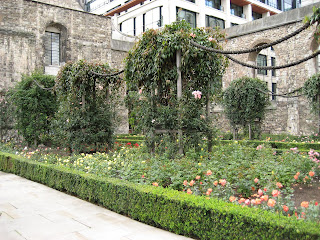I tell students all the time that they can't do a Google search and call it research. They have to use library and academic database resources. I teach them the differences between intranet sources and internet sources. And I teach them that if they do find things on websites, they need to consider who the author is and what their expertise is, whether the product is peer reviewed, and whether it's an academic site. If they can't figure out the answers to those three elements, they can't use the source. And so on and so forth.
That said, sometimes I use Google or another search engine (but usually it's Google) as part of my research. When I'm do, though, it's usually as a supplement to more academic search engines and databases, and it's usually because I'm looking for scholarly websites on a particular subject that might lead me to traditional sources I've missed (if, say, they have a bibliography on their site).
So the other day I decided (on a lark, really) to enter the name of one of the 15th century dudes associated with the manuscript I'm studying and working on. He wasn't the owner, but he witnessed the ownership -- as attested in a statement in the flyleaf of the manuscript. I don't know what I thought I'd find, but I thought I'd try it. One of the things that came up was an abstract for a conference paper I gave, so that didn't get me anywhere. But what also came up was a resource I didn't know existed: British History Online. I really should've asked my historian friends about resources, because knowing about this site would've saved me a lot of time. It has digitized, searchable versions of the Calendar of Letter Books and other records that I'd taken manual notes from some months ago. Cutting and pasting would have been a lot faster, not to mention the fact that I also had to drive to another school's library to use some of these sources because they were non-circulating.
But also, in doing my random Googling -- which, btw, ranked the BHO site first -- and then using the BHO site, I discovered a few more little tidbits about my dude that I hadn't previously found. Nothing earth-shatteringly amazing and nothing that really relates directly to my project in any real substantive way, but I did learn when he died and where he was buried, in the chapel of the Grey Friars. And it turns out that last summer, while walking back from the City to my room in Bloomsbury, I'd taken a picture of the public garden that now stands on the ruins of the Grey Friars and I had pretty much stood on the spot where my guy had been buried (or close, anyway). Again, no real major discoveries, but at least I got a blog post out of it! And I find some sort of charming serendipity in the fact that I took a picture of a rose garden in a ruined chapel just because I thought it was pretty, and it turned out to have a connection to one of the people I was researching. Here's the picture:
I feel like I should write something deep about memory and the aesthetic, or the ghosts of the past that haunt London, or something like that, but I've got a terrible cold and can't think clearly. All I can think about is the various periods of cataclysmic change and destruction this site has experienced, from the Reformation to WWII, and whether or not my guy's bones are still under that concrete or soil (was I standing over him as I took the picture?), or if they relocated the burials at some point in history -- in the Dissolution? After the Great Fire? When Christopher Wren rebuilt the church? After the Blitz? When they planted the garden? This is where Google fails me and it's not worth me tracking down. But the interwebs did serendipitously give new meaning (for me, at least) to my picture of a pretty rose garden.
Saturday, January 26, 2008
Serendipity
Tags:
research,
research travel
Subscribe to:
Post Comments (Atom)





1 comment:
"I feel like I should write something deep about memory and the aesthetic, or the ghosts of the past that haunt London, or something like that"
I think I'm an Anglophile in part precisely because of that sort of thing--that sense of the past, in casual connection with the everyday. Or maybe just because I like old stuff--but I suppose that's kind of the same thing!
Post a Comment